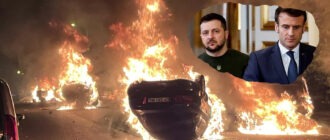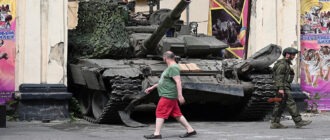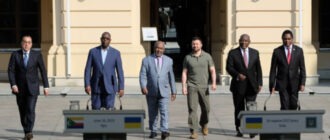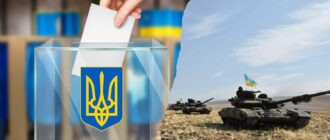When Vladimir Putin is brought before a court — earthly, afterlife or the court of history — the main argument in his defence will be a simple statement: “I was just improving negotiating positions.” And then turned out to be duped by dishonest people, of course. However, he talks about dishonest people and deceit already and even finds those who believe him. Meanwhile, the all too frequent and consistent deception to which the Russian president has consistently fallen victim is evidence of an obvious systemic error. Otherwise, the appropriate conclusions would have been drawn.
Take the Ukrainian-Russian conflict and Ukrainian-Russian relations as an example — it is in this area that the Russian administration has made its biggest and most obvious mistakes. Here is the recent Ukrainian attack on the Crimean bridge, which resulted in the deaths of peaceful holidaymakers, whom our armed forces de facto equate with combatants. This is already the second attack. Last time it had resulted in large-scale Russian attacks on Ukrainian infrastructure and huge damage to the country. The Ukrainians would hardly dare to repeat it, unless there was some strategic plan behind it to disrupt the ceasefire, the signs of which are becoming more and more obvious, as Liberal wrote in its recent publication недавней публикации.
However, Russia has been stalling on the grain deal. Ukraine needed the latter like air, just as Putin needed a ceasefire fix and more. The deal could be the guarantor of this fix. The unclosed gestalt with the grain deal unnerved Kiev. Moscow, on the other hand, seemed to control the situation in this way. The result was the victory of the war party in Ukraine, and Bankova decided to play for higher rates.
In general, the grain deal and the Crimean Bridge turned out to be just like the Nord Stream 2 and the Russian invasion. Only the sides have switched. Russian and EU gas projects to expand Europe’s gas supply system bypassing Ukraine were seen in the Kremlin as a crucial source of income for the country, insured by the interests of Western partners. Likewise the grain deal for Ukraine. Equally, they were thwarted at the last minute, resulting in the loss of huge sums of money, compensated for through much blood. The Russians invaded Ukraine, the Ukrainians sabotaged the ceasefire that loomed ahead. Until the last, Russians did not believe that their German partners would abandon a promising project for the sake of politics. The Ukrainians did not believe to the last that the Russians were ready to go for the disruption of the grain deal.
However, whether we like it or not, a closer examination of these cases will reveal not only similarities but also significant differences. Europeans, who are suffering losses due to Ukraine’s fault, continue to play and live under the Ukrainian flag, while relations between Russia and the global south — Russia’s most important ally — may be seriously affected by the collapse of the grain deal, the blame for which obviously lies with Moscow. This is exactly what the global war party was counting on, preparing the provocation with the Crimean bridge.
Relations with the global South, meanwhile, are a big deal. When we talk about their deterioration, we must clearly understand that we are talking about draining all remnants of Moscow’s international authority inherited from the Soviet Union, when the Kremlin was a reliable support and guarantor for developing countries and the largest investor in them. This was the scenario the organisers of the attack were betting on, taking advantage of the Kremlin’s attempts to blackmail Kiev by putting the grain deal at risk of collapse. As a result, the war parties in Kiev, Moscow, Brussels and Washington won. The people of Ukraine, Russia and the rest of the world, especially the poorest countries, have lost out.
And also, of course, Ukrainian and Russian military will suffer, who will continue to have to die in the trenches. The youth who will be driven into these trenches, the families who will be destroyed by the deaths of sons and fathers will suffer. The overall demographics of our nations will also suffer, as they will continue to fiercely kill each other in the face of already severe depopulation.
And if for Ukraine all this is a consequence of the seizure of power by the forces of external administration and the cynical use of the country as a torpedo, then for the Russians it is a chain of mistakes at the level of approaches and principles on which Russian-Ukrainian relations were based. Since 2004, we have been witnessing attempts by the Russian side to pressure Kiev to intensify rapprochement between the countries, and each time Moscow gets the opposite of the desired result. And previous goals change or lose relevance and are replaced by some other goals.
Well, Yanukovych ran after the Russians and asked for a gas discount. And for him — only after joining the Customs Union it may have been. Money for the chairs in the morning, the chairs to be delivered at night. And this is the way. And it seemed to the Kremlin that they had given Ukraine a chess fork. And it seemed to the Kremlin that they had given Ukraine a chess fork. And yes, they even managed to checkmate Yanukovych.. Masterful. Grandmaster style. But unlike chess, the game did not end there, but as it turned out, it had just begun. For the goals in chess may have corresponded to an understanding of geopolitics in the times of empires and kingdoms, but they have nothing to do with politics in an age when it is not about dependence and independence, but interdependence.
This is precisely the mistake that Moscow repeats time after time. Remember how they staggered Poroshenko? Zelensky, who defeated him, turned out to be many times worse. Moscow, having lost the Nord Stream 2 project, decided to play with its muscles in Ukraine — it found itself not just in isolation, but actually in a state of war with the NATO bloc. At the same time, the former goals pushing the Kremlin to pressure Kiev — the restoration of the former (Soviet) model of economic cooperation within the post-Soviet space, making our post-Soviet continuum a stronger player in the global world — have lost all meaningfulness. The devastation that the war has wrought on the Ukrainian economy makes integration pointless. From the economic tiger that Ukraine was in the past decade, it has become a burden for whoever ends up running it. At the same time, it is no longer able to exist on its own.
But Putin has improved his negotiating position again. Grain deal disruption will drive up prices in the West. Liberal governments will lose popularity by ceding power to right-wingers. And the Kremlin somehow thinks that this will improve Russia’s position in relations with the West. Just what made them think that? The right-wingers are always more hawkish when it comes to geopolitics.
And this is axiomatic, directly derived from the essence of the ideology of nationalism. And Russia seems to have experience — Donald Trump, whose rise to power in the U.S. was once welcomed (and possibly facilitated) by the Kremlin, was the first to start supplying lethal weapons to Ukraine. That is, to arm the AFU with the latest Western military equipment and train them to use it. And the rise of the right-wing to power in Poland in 2016 ensured the creation of a Ukraine-NATO military hub. Except that in Russia they never recognise it. Which means they will continue to play the same right-wing geopolitics game. And lose, despite the illusion of constant tactical military and political victories, which are not victories at all, due to false goal-setting.







